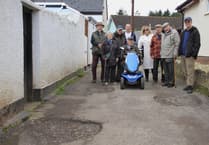ADVICE has been shared this week by social enterprise and dementia day care provider The Filo Project on the top three issues about which affected families in Somerset seek help.
The Filo Project, which hosts dementia day care groups in Minehead, Wellington, and Watchet, was taking part in Dementia Action Week, which runs until May 21.
According to NHS England, nearly 10,000 people in Somerset live with dementia, a condition caused by diseases of the brain, such as Alzheimer’s and vascular dementia.
Caring for a loved one with dementia or symptoms of memory loss can be stressful, with many family carers reporting significant emotional and financial challenges.
Common dementia symptoms include:
Confusion and needing help with daily tasks such as shopping
Memory loss
Problems finding the right word or following a conversation
Changes in behaviour, such as becoming unusually anxious or irritable
The Filo Project is a local, award-winning social enterprise offering unique dementia day care within hosts’ homes for small groups of socially-isolated older people with early to moderate dementia.
Its innovative, free, personalised family support service was set up in October, 2022, to meet growing demand from clients’ families, after staff identified that many felt isolated and did not receive adequate support themselves.
Many family carers were at risk of burnout and experiencing a sense of bereavement at the loss of their shared planned future.
Since its launch, the Filo Family Support Service has helped nearly 80 dementia carers.
Each client family is assigned a dedicated support worker offering regular, scheduled check-ins, signposting to information and the financial help wo which they are entitled, assistance with referrals to social services, and providing emotional support.
The organisation believes that with the right support for both the person living with the condition and their family, people can still live well with dementia.

Filo Project Somerset Family Support Service’s Jane Chamberlain said: “When we set up the family support service we had anticipated that most carers would come to us for practical help and signposting to other services.
“However, we found that a huge proportion of families turn to us for emotional support.
“They need someone who can really listen to them share their worries in a safe and confidential space, help them settle their thoughts and explore their own solutions.”
Here, Jane shares advice on the top three issues client families seek support on:
Issue 1: Someone to Talk to
Caring for a loved one with dementia is a very lonely experience for many people and even when they have friends and family around, most carers tell us that they often feel isolated.
Almost every carer tells us they want someone they can talk to who understands the situation and what it is really like caring for someone with dementia.
Many family carers feel no one has time to listen or have been offered completely impractical advice.
Advice:
If you have a friend or relative who is a carer, one of the best gifts you can give them is your time and undivided attention.
Ask them how things are going and really listen to what they are saying without offering opinions or advice, unless they ask for it.
Too much advice from others can add to their confusion and sense of overload.
Notice how the person is really feeling beyond the words they tell you.
Many carers say, ‘I’m fine’, when they are not.
When carers are able to share their worries and concerns it helps their thinking to settle and puts them in a more secure and grounded place so they can come up with their own solutions to problems.
Issue 2: Coping with Change
Coping with change can be very challenging for carers.
Often they cannot do many of the things they used to.
For example, if the person they care for has problems with mobility and co-ordination they may no longer be able to go out for walks together or they may be unable to leave the person they look after on their own, so their ability to socialise and do things that they enjoy is limited.
Advice:
Many carers have been used to living a very independent life and are reluctant to ask for help from others as they do not want to burden or upset family and friends.
Very few ask for help even when others offer.
They tell us that they ‘just have to make the best of it’, or ‘this is what my life is now’.
If you are able to support someone who is caring for someone with dementia, look for ways that you can offer practical help directly.
It is easier to say yes to ‘I can come and sit with your husband while you go to the hairdressers tomorrow’, than it is to respond to ‘Let me know if I can help’.
Issue 3: Grief and a sense of loss
Their loved one is still there, but many carers grieve for the person their loved one used to be, for the future they had planned together, and the loss of their lifestyle and independence.
It is very normal for their feelings and grief to change from day to day.
Advice:
At Filo we encourage carers to talk about times in the past when they have been grieving and what coping strategies have worked well for them.
We remind them emotions go up and down and some days will be more difficult, but they will pass.
We discuss their innate strength and resilience, thinking back to how they cope when things are challenging and how they will get through the difficult times.
We also encourage carers to take care of their physical and mental health, so they will be better able to cope in their caring role.
It is fine to rest when they need to and to listen to what their body needs.
We also discuss how when we are feeling anxious or stressed it is not always wise to trust our thinking.
It is better to wait until our thinking settles before making complex or difficult decisions.
We also try to draw carers’ attention to what is going well and how much they are achieving every day. Often negative thinking can overshadow all the positives in a carer's life and it is good to be reminded of this.
The Filo Project co-director Libby Price said: “Social care needs to be truly holistic and look after the family carers as well as the person affected by dementia.
“We believe that when carers are well supported, their physical and mental health are likely to be more resilient and they are in a better position to fulfil their caring role.
“At The Filo Project we are in a unique position to help our clients’ families as we see them every week and get to know them well.
“We notice when carers are struggling and can proactively offer support at the earliest opportunity, and the difference it makes shows that good care can be an effective treatment in itself.”
The Filo Project was set up in 2014 and has supported more than 3,000 older people in Somerset, Devon, and East Lancashire, many of whom were previously unable to access care due to financial or logistical constraints due to their rural location.




